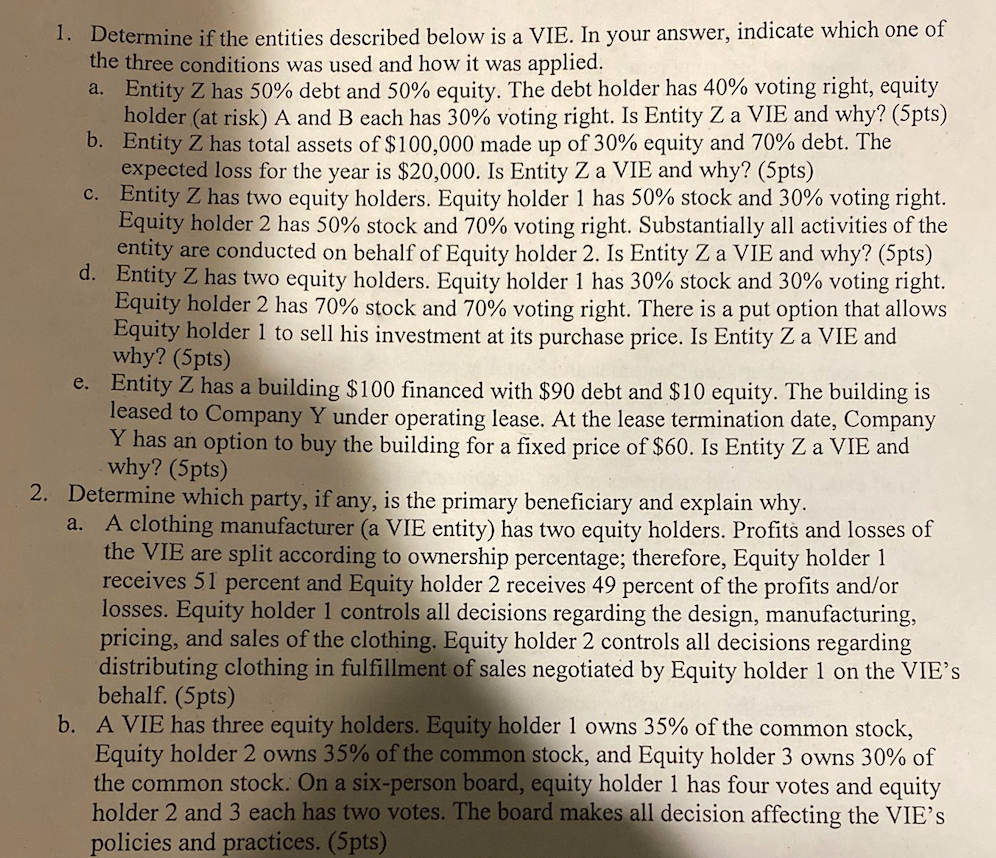
Determine if the entities described below is a VIE. In your answer, indicate which one of the three conditions was used and how it was applied. a. Entity Z has 50% debt and 50% equity. The debt holder has 40% voting right, equity holder (at risk) A and B each has 30% voting right. Is Entity Z a VIE and why? (5pts) b. Entity Z has total assets of $100,000 made up of 30% equity and 70% debt. The expected loss for the year is $20,000. Is Entity Z a VIE and why? (5pts) c. Entity Z has two equity holders. Equity holder 1 has 50% stock and 30% voting right. Equity holder 2 has 50% stock and 70% voting right. Substantially all activities of the entity are conducted on behalf of Equity holder 2. Is Entity Z a VIE and why? (5pts) d. Entity Z has two equity holders. Equity holder 1 has 30% stock and 30% voting right. Equity holder 2 has 70% stock and 70% voting right. There is a put option that allows Equity holder 1 to sell his investment at its purchase price. Is Entity Z a VIE and why? (5pts) e. Entity Z has a building $100 financed with $90 debt and $10 equity. The building is leased to Company Y under operating lease. At the lease termination date, Company Y has an option to buy the building for a fixed price of $60. Is Entity Z a VIE and why? (5pts) 2. Determine which party, if any, is the primary beneficiary and explain why. a. A clothing manufacturer (a VIE entity) has two equity holders. Profits and losses of the VIE are split according to ownership percentage; therefore, Equity holder 1 receives 51 percent and Equity holder 2 receives 49 percent of the profits and/or losses. Equity holder 1 controls all decisions regarding the design, manufacturing, pricing, and sales of the clothing. Equity holder 2 controls all decisions regarding distributing clothing in fulfillment of sales negotiated by Equity holder 1 on the VIE's behalf. (5pts) b. A VIE has three equity holders. Equity holder 1 owns 35% of the common stock, Equity holder 2 owns 35% of the common stock, and Equity holder 3 owns 30% of the common stock. On a six-person board, equity holder 1 has four votes and equity holder 2 and 3 each has two votes. The board makes all decision affecting the VIE's policies and practices. (5pts) Determine if the entities described below is a VIE. In your answer, indicate which one of the three conditions was used and how it was applied. a. Entity Z has 50% debt and 50% equity. The debt holder has 40% voting right, equity holder (at risk) A and B each has 30% voting right. Is Entity Z a VIE and why? (5pts) b. Entity Z has total assets of $100,000 made up of 30% equity and 70% debt. The expected loss for the year is $20,000. Is Entity Z a VIE and why? (5pts) c. Entity Z has two equity holders. Equity holder 1 has 50% stock and 30% voting right. Equity holder 2 has 50% stock and 70% voting right. Substantially all activities of the entity are conducted on behalf of Equity holder 2. Is Entity Z a VIE and why? (5pts) d. Entity Z has two equity holders. Equity holder 1 has 30% stock and 30% voting right. Equity holder 2 has 70% stock and 70% voting right. There is a put option that allows Equity holder 1 to sell his investment at its purchase price. Is Entity Z a VIE and why? (5pts) e. Entity Z has a building $100 financed with $90 debt and $10 equity. The building is leased to Company Y under operating lease. At the lease termination date, Company Y has an option to buy the building for a fixed price of $60. Is Entity Z a VIE and why? (5pts) 2. Determine which party, if any, is the primary beneficiary and explain why. a. A clothing manufacturer (a VIE entity) has two equity holders. Profits and losses of the VIE are split according to ownership percentage; therefore, Equity holder 1 receives 51 percent and Equity holder 2 receives 49 percent of the profits and/or losses. Equity holder 1 controls all decisions regarding the design, manufacturing, pricing, and sales of the clothing. Equity holder 2 controls all decisions regarding distributing clothing in fulfillment of sales negotiated by Equity holder 1 on the VIE's behalf. (5pts) b. A VIE has three equity holders. Equity holder 1 owns 35% of the common stock, Equity holder 2 owns 35% of the common stock, and Equity holder 3 owns 30% of the common stock. On a six-person board, equity holder 1 has four votes and equity holder 2 and 3 each has two votes. The board makes all decision affecting the VIE's policies and practices. (5pts)







